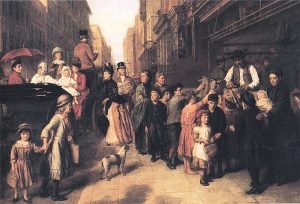Thoughts on Sunday’s Lessons for Feb. 13, 2022 (Epiphany 6C)
First Reading: Jeremiah 17:5-10
Easter is late this year, April 17, so Ash Wednesday doesn’t come until March 2. The extra weeks that this leaves after Epiphany offer readings that we only occasionally hear.

Poverty and Wealth (1888), oil painting on canvas by William Powell Frith (1819-1909). Private collection. (Click image to enlarge.)
This week we’ll hear Luke’s version of the Beatitudes, which is a little more edgy than Matthew’s familiar Sermon on the Mount. The rest of Sunday’s readings also offer nutritious food for thought. For our first reading, in a division that might remind us of Luke’s blessings and woes, Jeremiah separates the cursed – who turn from God to trust in mortals and must wither and die – from the blessed, who trust in God and will be deeply rooted and nourished like plants near
Psalm: Psalm 1
The Psalmist, too, seems to divide all humankind into two parts in this, the first of the 150 Psalms. Echoing the covenant that God gave to Moses and the people at Mount Sinai, they sing praise for righteousness and its rewards while warning about the dangers of following the ways of the wicked. Using metaphors that echo the thoughts of Jeremiah in the first reading, the Psalmist promises delight for the righteous, who will thrive and bear fruit like trees planted near water. Not so for the wicked, the verses continue. They will be doomed like chaff that the wind blows away.
Second Reading: 1 Corinthians 15:12-20
In the closing chapters of First Corinthians, Paul continues working out his theology of salvation through Christ’s resurrection. Writing at least a generation before Mark (the first of the Gospels), Paul’s words offer us a glimpse at the ideas evolving in an infant Christian community whose oral tradition went back to the adult ministry of Jesus less than 20 years earlier. Paul challenges those who doubt that Christ’s resurrection means that we, too, are freed from the fear of death. If Christ was not raised, Paul says, then our faith has been in vain and our sins have not been forgiven. But in fact, Paul insists, Christ was raised from the dead; he is the first fruit of all who die and will now live again.
Gpspel: Luke 6:17-26
We read this version of the Beatitudes from Luke’s Sermon on the Plain three years ago when Easter also fell late, but before that it hadn’t come up since 2007. It’s unfortunate that we hear it so seldom, as its contrasts with Matthew’s version of the Beatitudes from his Sermon on the Mount give us plenty to think about. Having spent the night on a mountain in silent prayer, Jesus comes down to a level place and talks to his just-chosen disciples and a huge crowd of followers. His series of beatitudes take a more edgy tone as he follows a series of blessings with a series of woes. Blessed are the poor – the actual poor, in contrast with Matthew’s “poor in spirit” – the hungry, those who weep and those who are reviled. Luke shows Jesus also declaring woe to the rich, those who are full of food and wealth, those who laugh as they receive constant praise. Listen for this liberating preference for the poor and downtrodden throughout this year of Luke.

Dear “Illuminations”,
God bless your ministry.
Thank you for the compliment of utilizing my icon of Zacchaeus in your 10/29/2019 post here…
http://cliffwoodorganic.com/illuminations/category/pentecost/page/6/
If you care to attribute it, you may do so with “By the Hand of Nicholas P. Papas”.
With Gratitude,
Nick
Dear Nick! Thanks so much for letting us know! We loved your icon and took it from an Internet source that we assumed was free for use. I always wish to credit artists for their work, though, and I shall immediately add your credit line.
Peace,
Robin Garr
Nick, thank you again, and blessings on your work. Here is a direct link to the page including your beautiful Zacchaeus icon:
http://cliffwoodorganic.com/illuminations/2019/10/29/pentecost-21c-3/